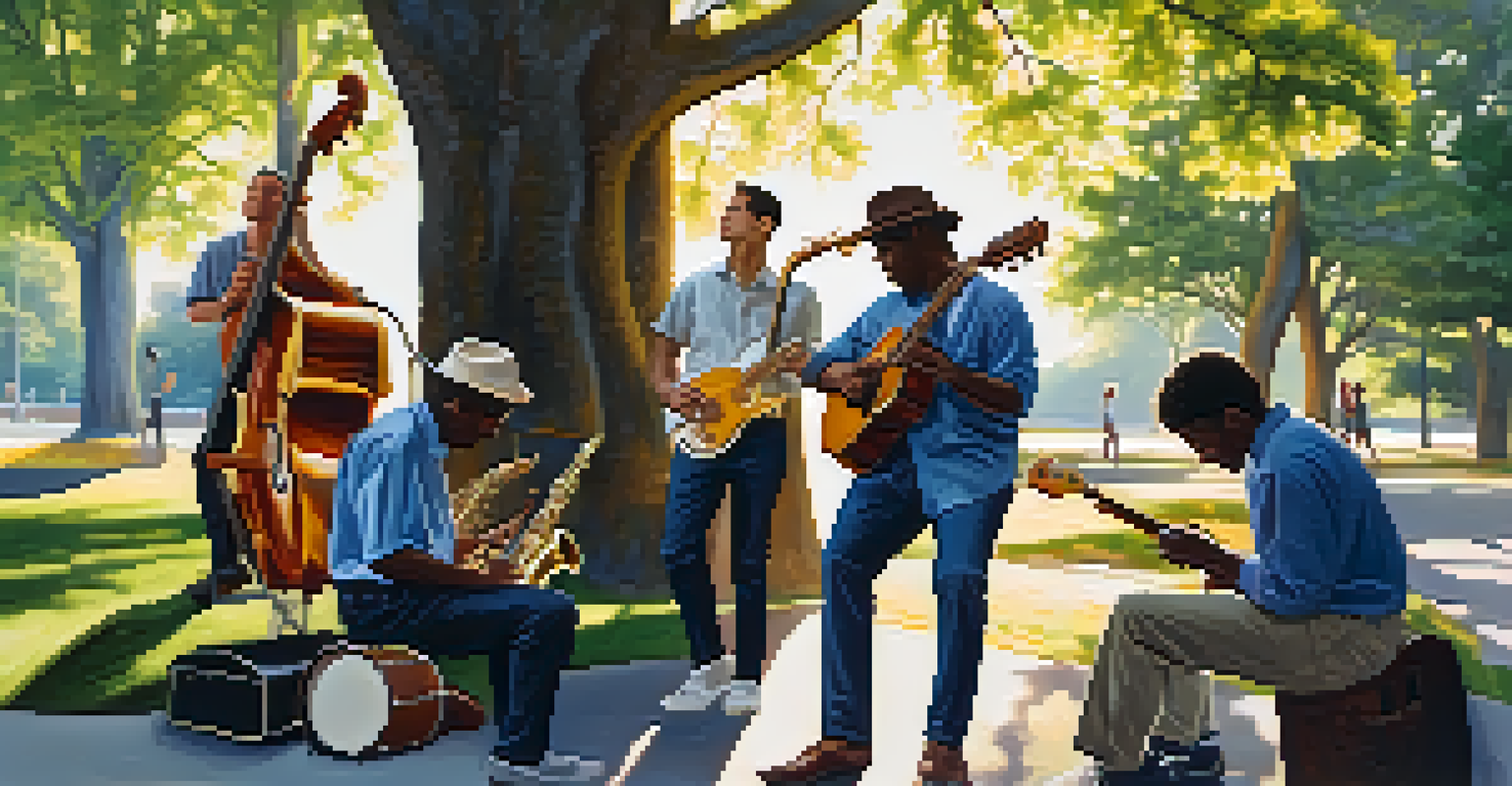The Importance of Ear Training for Developing Musicianship

Understanding Ear Training and Its Benefits
Ear training is the practice of developing the ability to identify and understand musical elements by ear. This includes recognizing pitches, intervals, chords, and rhythms. By honing these skills, musicians can improve their overall musicianship, making them more versatile and adaptable in their performances.
Ear training is not just a skill; it’s a way of listening to the world around us and understanding the music within it.
For example, a guitarist who can accurately identify chords and melodies by ear will have an easier time jamming with other musicians. This skill not only enhances their playing but also boosts their confidence in collaborative settings. Moreover, it opens up a deeper connection to the music, allowing for a more expressive performance.
Ultimately, ear training cultivates a strong foundation for musicianship, ensuring that musicians are not just playing notes but truly understanding the music they create. This foundational skill can set the stage for future growth and exploration in a musician's journey.
The Connection Between Ear Training and Improvisation
Improvisation is a crucial aspect of many musical genres, from jazz to rock. A well-trained ear allows musicians to react and adapt to musical changes in real-time, making improvisation more fluid and enjoyable. Without ear training, musicians may struggle to keep up with the spontaneous nature of improvisation.

Think of ear training as a musician's GPS; it helps navigate the unpredictable twists and turns of a jam session. When a musician can instantly recognize chord changes or melodic patterns, they can confidently contribute to the conversation happening in the music. This leads to richer and more dynamic performances.
Ear Training Enhances Musicianship
Developing ear training skills leads to improved timing, expression, and collaboration among musicians.
In essence, ear training equips musicians with the tools needed to think on their feet, creating a seamless bridge between practice and performance. This skill not only enhances individual musicianship but also enriches the overall group dynamic during live performances.
Building a Strong Musical Vocabulary Through Ear Training
Just like learning a new language, developing a musical vocabulary is essential for effective communication in music. Ear training helps musicians recognize various musical phrases, styles, and techniques, enabling them to express themselves more clearly. A broad musical vocabulary allows for more nuanced performances and compositions.
Music is the shorthand of emotion.
For instance, a musician familiar with different genres can draw inspiration from various styles, enriching their own music. By training their ear to identify and replicate these influences, they can create unique and innovative sounds. This versatility is particularly valuable in collaborative settings, where diverse influences often converge.
Moreover, a well-developed musical vocabulary enhances a musician's ability to analyze and critique music. This skill not only aids in personal growth but also fosters a deeper appreciation for the art form, allowing musicians to engage with music on a more profound level.
The Role of Ear Training in Music Theory Understanding
Music theory provides the framework for understanding how music works, but it can sometimes feel abstract. Ear training bridges the gap between theory and practice, allowing musicians to hear and recognize theoretical concepts in real-time. This makes learning theory more intuitive and accessible.
For example, when a musician learns about intervals in a theory class, they can practice identifying those intervals by ear. This hands-on approach strengthens their understanding and retention of musical concepts. As a result, musicians can apply theoretical knowledge more effectively when composing or performing.
Improvisation Relies on Ear Skills
A well-trained ear allows musicians to adapt and respond fluidly during improvisational performances.
In summary, ear training enriches a musician's theoretical knowledge by transforming abstract concepts into tangible experiences. This integration of theory and ear training fosters a well-rounded musician capable of navigating complex musical landscapes with ease.
Enhancing Musical Memory with Ear Training Techniques
Musical memory plays a vital role in a musician's ability to perform and compose. Ear training techniques can significantly enhance this memory, making it easier to recall melodies, harmonies, and rhythms. By regularly practicing ear training, musicians can improve their retention of musical ideas and concepts.
Consider the practice of singing back melodies or transcribing songs by ear. These exercises not only strengthen a musician's memory but also reinforce their understanding of music structure. As they become more adept at remembering and recreating music, their confidence in performance settings grows.
Overall, cultivating a strong musical memory through ear training empowers musicians to express themselves freely and creatively. This skill is invaluable for both performance and composition, allowing musicians to draw from a vast reservoir of musical ideas.
The Impact of Ear Training on Overall Musicianship
As musicians develop their ear training skills, they will notice a positive impact on their overall musicianship. Enhanced listening abilities lead to improved timing, phrasing, and expression in performances. Musicians become more aware of their surroundings, allowing them to connect with fellow performers and the audience.
For instance, a drummer who can listen and respond effectively to other band members will create a tighter, more cohesive sound. This heightened awareness also enables musicians to make better artistic choices, leading to more compelling performances. The result is a richer musical experience for both the performer and the audience.
Build Musical Vocabulary Through Training
Ear training helps musicians recognize diverse musical phrases and styles, enriching their expression and creativity.
In essence, ear training is a catalyst for comprehensive musicianship. It strengthens the bonds between technical skill, theory, and creativity, allowing musicians to express themselves more authentically and effectively.
Practical Tips for Incorporating Ear Training into Your Routine
Incorporating ear training into your daily practice routine doesn't have to be daunting. Start by dedicating just a few minutes each day to listening exercises, such as identifying intervals or transcribing melodies. As you become more comfortable, gradually increase the complexity of the exercises to challenge yourself further.
Another effective technique is to engage with ear training apps or online resources. These tools often provide structured lessons and quizzes that can make learning fun and interactive. By setting specific goals and tracking your progress, you can stay motivated and see tangible improvements over time.

Remember, consistency is key! Regular practice will strengthen your ear and enhance your overall musicianship. As you integrate ear training into your routine, you'll likely find yourself playing with more confidence and creativity, unlocking new dimensions in your musical journey.
The Long-Term Benefits of Committing to Ear Training
While the immediate benefits of ear training are clear, the long-term advantages are equally significant. Musicians who commit to ear training often experience sustained growth in their abilities over time. This foundation not only enhances technical skills but also fosters a deeper emotional connection to music.
As you continue to develop your ear, you may find that you become more adept at interpreting and creating music. This can lead to new opportunities in your musical career, whether that's writing songs, performing, or collaborating with others. The skills gained through ear training can open doors to various musical paths.
Ultimately, the commitment to ear training is an investment in your musicianship. The benefits extend far beyond immediate improvements, laying the groundwork for a fulfilling and dynamic musical journey that evolves with you.